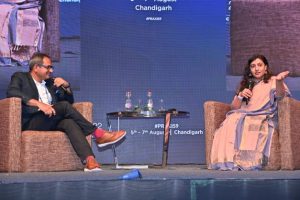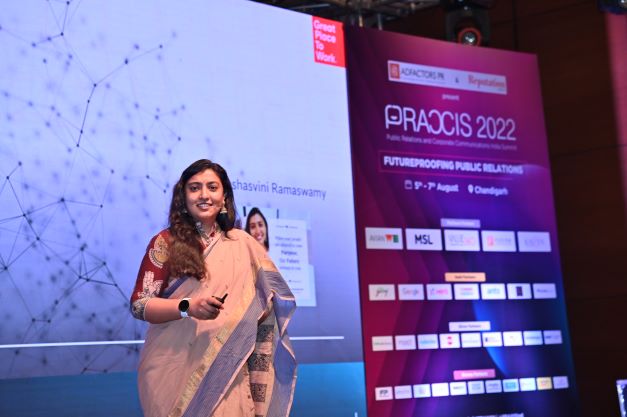In a digital borderless world, products, technology, people, market strategy can all be copied. What remains ours is our workplace culture and purpose – and that is our competitive advantage explained Yeshasvini Ramaswamy, CEO, Great Place to Work, as she spoke about “The Role of Organisational Culture as a Component of Public Relations”. In order to retain proper employees and avoid the “Great Resignation” (an ongoing economic trend in which people willingly depart), it’s vital to adapt to change. Connection or the ‘connectivity’ of information makes different cultures come closer, separated only by a thin line. Integration of culture is crucial to the success of an organisation.
As CEOs have you defined your ‘why’, she questioned. Today, communication strategists have evolved. She spoke about the big economic continental shift and its affect on workplace culture especially on millennials, GenZ, alpha and the gig workforce. In companies there are 4 – 5 generations and how each one relates to the pupose will be different. These are exciting times indeed.
And the question we have to ask is – are we modelling our businesses to be future-ready? Culture will adapt and will force you to take decisions. HR is responsible for employees’ experience and culture is the CEO’s responsibility’, she shared. Everything is becoming “real” time, and we have to learn how to deal with it.
Workplace culture is not short term. Life comes full circle. In a free enterprise, the community is not just a stakeholder of the business but the basic essence of business.
How does culture affect Public Relations? The link between culture and Public Relations is very obvious and logical too. Culture affects communication, and is affected by it. Because Public Relations is fundamentally all about communication, it falls into place – to conclude that culture affects Public Relations also.
Cultural awareness in PR is critical
Cultural awareness in PR is important because it helps in many ways – to maintain relevance, elevate brand awareness, keep your clients happy, and it also enhances your bottom line.
 During a conversation with Vineet Handa, Founder & CEO, Kaizzen pointed out that “culture is still overhyped” to which she added that she did not think there’s any company that does not have a culture and it’s not for us to say whether the culture is good or bad.
During a conversation with Vineet Handa, Founder & CEO, Kaizzen pointed out that “culture is still overhyped” to which she added that she did not think there’s any company that does not have a culture and it’s not for us to say whether the culture is good or bad.
Is culture being talked about because of the pandemic? Her point of view was – the narrative in India is new, and in the next ten years it’s going to be more important. “I don’t think it is a new phenomenon, but we need to look at it.” Besides, culture does not come cheap and it does not cost you anything.
The pandemic was a challenge, and now there is “fatigue”! Her suggestion was – have meetings like “Ask Me Anything” where you are curating a sense of belongingness – that’s the answer! The pandemic has forced everyone to go back to basics: eat properly, sleep well, and maintain a work-life balance that prioritises health, family, and job, rather than just work. Yes, businesses are adjusting to the changes.
Then came the final touch. She rounded it off by saying – culture is not the destination, it is the journey.
The views and opinions published here belong to the author and do not necessarily reflect the views and opinions of the publisher.






Be the first to comment on "PRAXIS 2022: The Role of Organisation Culture as a Component of Public Relations"